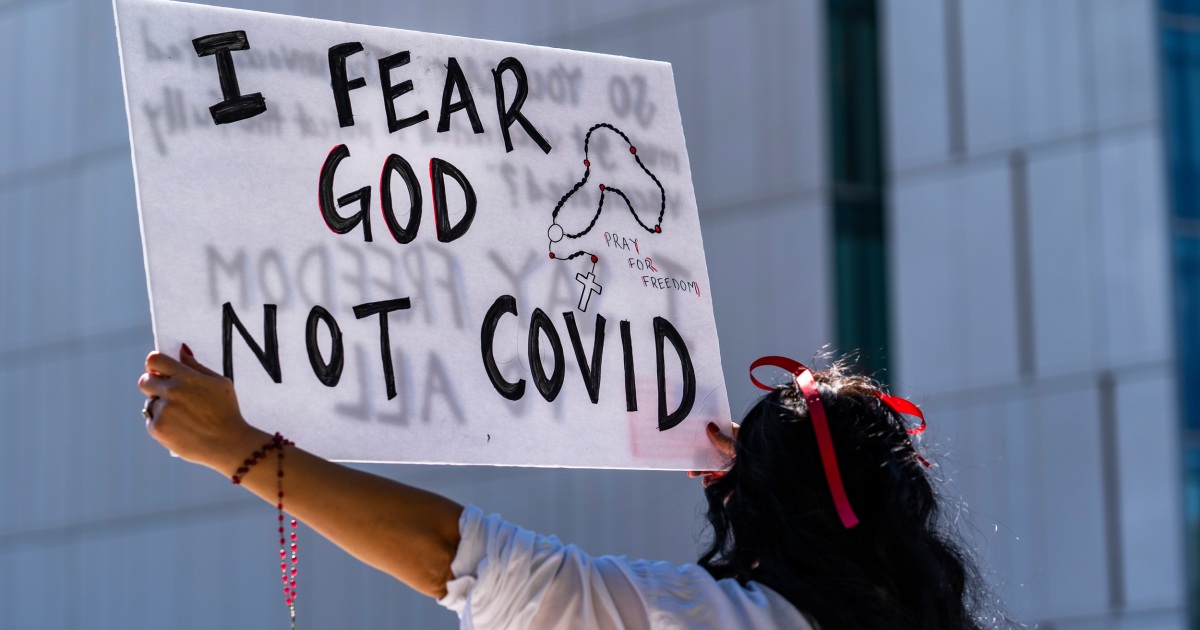
Since the pandemic began, a vocal subset of extreme-right conservatives have demanded that they need religious exemptions from many Covid-19 precautions — from emergency public health orders to mask mandates to vaccine mandates. They claim that the principle of religious freedom means they should be exempt from following lifesaving measures.
That claim may soon be tested.
We shall see if the same Christians who have been so vocal on anti-vaccine “rights” will come to Amos’ defense.
Brad Amos, a former senior video editor at Ramsey Solutions, filed a lawsuit this month against the finance advice company for refusing to accommodate his Christian beliefs. Those beliefs, he noted, required him to take lifesaving measures in the face of a deadly pandemic to protect his high-risk family members from infection. Amos claims that, in response, he was mocked and later fired for wearing a mask, attempting to socially distance and requesting to work from home.
We shall see if the same Christians who have been so vocal on anti-vaccine “rights” will come to Amos’ defense.
Personally, I doubt it. Because for many on the religious right, religious freedom only matters if it supports a right-wing political agenda. Indeed for years, extreme-right Christian groups have been misusing religious freedom to do everything from discriminating against LGBTQ people to denying access to reproductive health care. Far from a legitimate effort to protect the right to worship freely, religious freedom has been manipulated into another tool in the Christian nationalist playbook to circumvent any law or regulation they see fit.
At the start of the pandemic, when states were compelled to issue emergency public health orders to shut down in-person gatherings, including at houses of worship, the same groups who cried “religious freedom” at any law they disliked did so once again. It quickly became clear that if they could win exemptions from emergency public health orders on religious freedom grounds — even in the face of a deadly, highly contagious disease — they could win any claim by exploiting religious freedom.
If it were not apparent enough that these supposed claims of religious freedom ring hollow, an entire industry of anti-vaccine activists have now combined forces with Christian nationalists. Some clergy are even offering to provide religious exemptions — if you pay them. Liberty Counsel, the law firm that represented Kim Davis, the county clerk in Kentucky who refused to issue marriage licenses to same-sex couples, is a major player in providing legal guidance and representation to those seeking to use religious exemptions to circumvent Covid-related requirements.
But religious freedom does not matter, it seems, when Jewish groups state that life begins at birth, not at conception, and that denying the right to prioritize the life of a mother violates Jewish religious beliefs. Religious freedom does not matter when faith-based health care providers say they are morally, religiously obligated to provide care for all, without discrimination.
Many “religious freedom” advocates did not condemn the Trump administration’s ban on travelers from some predominantly Muslim countries — a de facto religious litmus test of our nation’s immigration system.
And when a religious freedom claim is made in order to save lives, consistent with public health guidance, then, at least according to Ramsey Solutions, it should not be granted.
It was never about religious freedom. It was always a right-wing political agenda, cloaked in faith.
As Jane Field, executive director of the Maine Council of Churches said in November, “To have religion used as a pawn in the service of deceit is deeply offensive to us.”
The truth is not a single religious denomination opposes the Covid vaccines. And according to the Public Religion Research Institute, “Six in ten Americans (59%) agree that too many people are using religion as an excuse to avoid COVID-19 vaccination requirements.” The free exercise clause of the First Amendment was never intended to be without limits, particularly, as the Supreme Court affirmed in 1941, when those limits could save lives.
As policymakers consider the arguments in Amos’ case and others, they should keep in mind that respecting religion in public life means respecting all religious beliefs (and nonreligion.) The easiest way to do that in the face of a pandemic? Forget politics, and focus on saving lives.
Source: | This article originally belongs to Nbcnews.com









